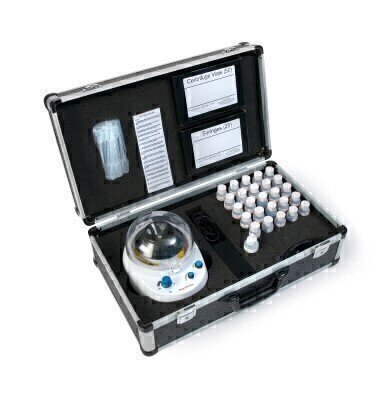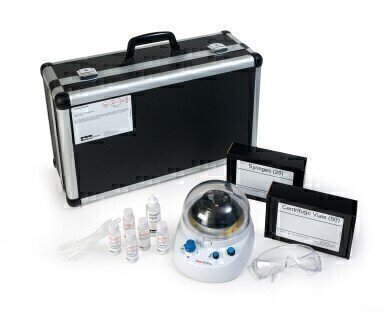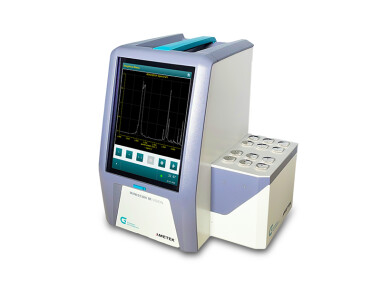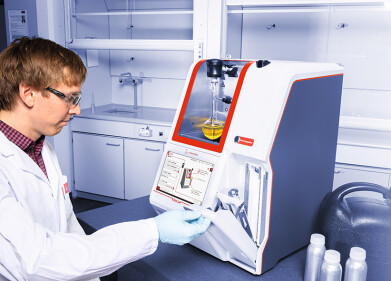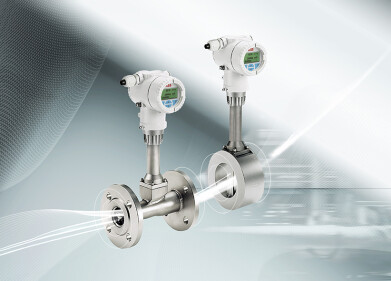Analytical Instrumentation
New Cat Fines Test Kit Launched
Oct 30 2015
Parker Kittiwake (USA), a leading global provider of asset control and protection technology, has today announced a breakthrough in the early detection of catalytic (cat) fines with the launch of its Cat Fines Test Kit. In minutes, this simple onboard test identifies the presence of abrasive silicon and aluminium catalytic fines, which can become embedded into engine components and cause abrasive wear, causing irreversible damage to a vessel’s fuel system if left undetected.
When fuel is stored for extended periods of time, cat fines – leftovers from the refinery cracking process – settle out of the fuel and build up as sediment in storage tanks. If the tanks are not drained regularly, this sludge can enter the fuel system and cause substantial damage to fuel pumps, injectors, piston rings and liners. The quality of fuel brought on board is increasingly difficult to predict. Until now, the detection of cat fines in fuel oil was only possible by obtaining a fuel sample, which is then sent for laboratory analysis. The Parker Kittiwake Cat Fines Test Kit provides accurate results onboard and in a matter of minutes, providing ship owners with an accurate picture of the level of corrosive elements present almost instantly, potentially preventing critical damage before it occurs.
The Cat Fines Test Kit is a simple to use, chemical bottle test which determines the level of cat fines present in a representative sample of fuel oil, allowing the operator to identify the ingress of abrasive and potentially damaging components in the fuel oil before it enters the system. The test kit can be used in conjunction with both laboratory testing and a range of other onboard condition monitoring tools, ensuring that operators have reliable and accurate data readily to safeguard against potentially catastrophic damage.
Earlier this year, leading fuel testing and inspection company Veritas Petroleum Services raised concerns that even when the ignition and combustion characteristics of a fuel have tested well and no chemical contaminant has been observed, cat fines can still remain undetected in the fuel and consequently enter the system, causing a total loss of propulsion. In parallel, underwriters are increasingly insistent on enforcing compliance with the guidance they issue on reducing the risk of cat fines, which means that owners who do not take sufficient steps to reduce their exposure to this hazard will find their claims much less likely to succeed.
Larry Rumbol, condition monitoring market development manager, Parker Kittiwake explained: “As more emission control areas (ECAs) come into operation, there are growing concerns around fuel quality and the number of engine wear situations related to cat fines are increasing. Research has shown that even small cat fines particles of below 10 micron contribute to wear, and we also know that high wear cases had bunkered fuel oil within the limits of the ISO 8217:2005 specification, which dictates a maximum of 60 ppm. This is why cat fines are causing such problems for shipowners.”
He continues: “The use of non-ISO compliant fuel, faulty fuel purifiers, or rough weather kicking up fines from the bottom of the settling tanks are all capable of introducing these particles into the fuel system. The Parker Kittiwake Cat Fines Test Kit provides an accurate and easy-to-use forewarning of these destructive particles and give a vessel’s crew maximum opportunity to take corrective steps.”
For more than two decades, Parker Kittiwake has designed, developed and manufactured condition monitoring and test equipment for lube oil, hydraulic oil and fuels. Engineers the world over use Kittiwake equipment to gain vital insights into the health of their vessels’ engines or to measure fuel quality and compatibility. The Cat Fines Test Kit is an important addition to the company’s comprehensive suite of condition-based maintenance (CBM) products, underlining Parker Kittiwake’s commitment to developing tools and technology that addresses the challenges faced by today’s ship owners and marine engineers.
Digital Edition
PIN 25.2 Apr/May
May 2024
Safety - Carbon monoxide toxic and flammable gas detection Analytical Instrumentation - Density: A fundamental parameter at critical stages within the petroleum sector - Advancements and...
View all digital editions
Events
Jul 10 2024 Birmingham, UK
Thailand Oil & Gas Roadshow 2024
Jul 11 2024 Rayong, Thailand
Jul 20 2024 Denver, CO, USA
Jul 21 2024 Cape Town, South Africa
Jul 24 2024 Bogata, Colombia
